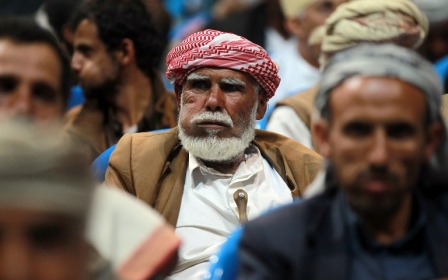Aden on edge as Houthis advance south

Hundreds of armed men are on the streets of Aden.
Guarding government buildings and manning checkpoints at entrances to the city, the men are part of so-called popular committees, a last line of defense against the Houthis, Islamist rebels from Yemen’s north who are closing in on the city.
Fears about losing Aden, a former British colony built in the crevices of an extinct volcano, have risen since the Houthis seized control of the capital Sana’a in late September, ousted the prime minister, and began toppling towns and battling al-Qaeda militants for territory in a push southwards.
Moving down from their stronghold in the mountains of Saada near the border of Saudi Arabia, the Houthis have reached as far south as Ibb, a province just 120 miles north of Aden.
“We will fight any armed group like the Houthis and al-Qaeda that attempts to undermine the security and stability of Aden,” a member of a popular committee in Aden, told Middle East Eye, waving his AK-47. “We will protect the government and private properties.”
Another committee member told MEE that a well-known military commander, Mahmoud al-Soubihi, has recruited the armed men from the neighboring provinces of Shawba and Abyan.
“The committees have been directed to guard the refinery, the seaport, the airport, the governor’s HQ and other key buildings in Aden,” a committee member told Aden-based Aden Al Ghad newspaper.
Critics though said the popular committees serve a different purpose: the armed men, they said, are part of Yemen’s well-known southern separatist movement who are agitating for an independent state in the south.
Rather than guarding the city, the men are there to amplify the threat of the Houthis in order to garner support for their movement and their bid for statehood.
South and north Yemen battled in a brief, bloody civil war in 1994, four years after a merger that joined the Marxist south with the tribal north.
The Southern Movement, or the ‘Hirak’, was formed in 2007 by thousands of military officers and public servants angered about northerners monopolizing power, wealth and natural resources.
Yemen’s southern separatists have intensified their protests since the Houthis took over the capital. Last month, Hirak supporters sent an ultimatum to the government threatening to declare independence if the government does not remove all its military forces from the south by 30 November.
Mistrust
Analysts said the deployment of armed men in Aden is an outcome of deep mistrust between powerful military generals in the north and south as well as a fear of a mutiny within their ranks.
Army generals in the south fear some of their soldiers who are sympathetic to the Houthis may break ranks and join the Islamist rebels if they reach the city, according to Fatehi Bin Lazreg, editor of Aden Al Ghad weekly.
The popular committees were first established in 2012 to help back an army offensive against al-Qaeda militants in the provinces of Shabwa and Abyan.
Exploiting a power vacuum left by a government grappling with popular unrest in 2011, al-Qaeda’s franchise in Yemen gained control of several cities in the south.
The government said it had cleared the south of al-Qaeda in June 2012, partly thanks to the popular committees who then took charge of handling security in the liberated areas and were given salaries from the Ministry of Defense.
“Al-Qaeda have failed in penetrate them. So, southern officials think that the Houthis will not be able to switch their allegiance,” Bin Lazreg said.
Exiled figures returned
Hours after the popular committees took to the streets, thousands of Hirak supporters gathered in downtown Aden on Wednesday to welcome a senior separatist leader who returned from exile in Saudi Arabia.
Pumping his fists, Abdul Rahman al-Jifiri, who served as vice president in the former Yemen Democratic Republic and fled to Saudi Arabia when northern troops entered Aden in 7 July 1994, told the gathering: “We have one clear demand; establishing a federal, sovereign and democratic state on the soil of the south.”
Responding to fears about the Houthis he said: “The south is not a small piece of land that can be swallowed easily. We will exercise our right for self-defense if the Houthis attack us.”
Northerners say that southerners have no reason to terminate the 1990 unification deal since the incumbent president, new prime minister and half of ministers are from the south. Also, the government has recently issued an official apology to the south for the civil war and reinstated thousands of pensioners.
Stay informed with MEE's newsletters
Sign up to get the latest alerts, insights and analysis, starting with Turkey Unpacked
Middle East Eye delivers independent and unrivalled coverage and analysis of the Middle East, North Africa and beyond. To learn more about republishing this content and the associated fees, please fill out this form. More about MEE can be found here.




